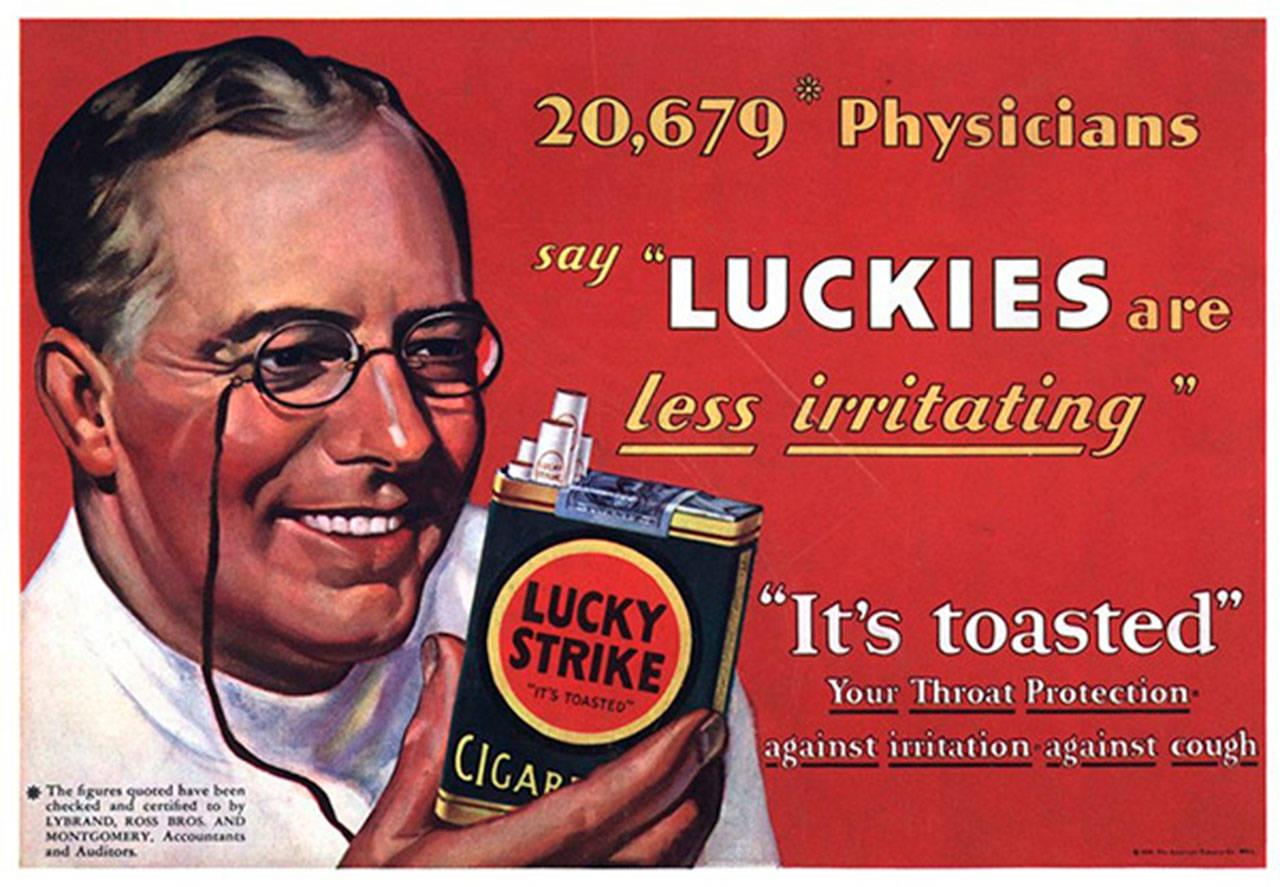By The Herald Editorial Board
Many of us have seen — or may even remember — advertising from the 1930s through 1950s in which a family doctor — in a white coat, spectacles and a friendly smile — prescribes a particular brand of cigarettes as “less irritating” if not just plain healthier for his patients.
It was no coincidence, of course, that the “physician-approved” ad campaigns came along as mounting research confirmed the health concerns about cigarettes and the dangers of smoking, even before the days of the Surgeon General’s Warning on every pack regarding the clear threats of cancer and heart and lung diseases.
So, while today you might find a doctor who smokes, you won’t find many who would recommend cigarettes or any tobacco product for their patients. And you certainly don’t see those ads anymore, except as a look back at antiquated ideas of what passed for good advice on health. The more than 480,000 annual U.S. deaths attributed to cigarette smoking and tobacco have been effective in countering that message.
Not that a similar marketing idea hasn’t occurred to at least one tobacco company.
Tobacco giant Altria Group isn’t making a pitch to doctors to again tout the health benefits of nicotine, the addictive agent in tobacco products. No, it’s seeking the help of the U.S. Food and Drug Administration.
Altria, reports Bloomberg, is asking the FDA to use its considerable public information reach to help correct the impression among three-fourths of U.S. adults who falsely believe that nicotine causes cancer. The makers of Marlboro cigarettes, in a letter to the FDA, want to persuade the agency to assist in switching cigarette smokers to “healthier” ways of delivering nicotine’s dopamine punch, methods that merely heat the tobacco, rather than burning it, which produces the more than 60 well-known cancer-causing agents inhaled in tobacco smoke.
Altria’s letter said the FDA’s help would aid the agency’s own goals of encouraging better health outcomes by getting more smokers to use non-combustible products that “may present lower health risk.”
In response to the request, the FDA wasn’t exactly reaching for its white coat and spectacles; it declined to comment, Bloomberg reported.
It’s true that nicotine — on its own — isn’t a carcinogen; but neither is it an elixir of health.
“Nicotine isn’t benign,” Eric Lindblom, a former senior adviser to the FDA’s Center for Tobacco Products, and now a senior scholar at Georgetown University, told Bloomberg. Studies show that it can interfere with brain development and birth outcomes, he said. “It’s an agricultural poison in large doses.”
The U.S. Surgeon General declared in 2010 that nicotine is one of the most addictive agents known; as addictive as cocaine and heroin. By stimulating the brain’s transmission of dopamine, the nicotine inhaled by tobacco users — including those who use the vaping devices most popular with youths — can produce addiction after smoking less than 100 times, the FDA has reported.
As for youths, whose brains still are developing, the Centers for Disease Control and Prevention warn that nicotine can be harmful, contributing to problems with concentration, learning, memory and impulse control. The rise in vaping’s popularity — and youths’ own misunderstanding about what they are inhaling when using e-cigarettes — leaves them open to nicotine addiction and a range of harmful chemicals and metals, including lead, nickel and tin, linked to lung disease.
Research published in 2015, by the National Institutes of Health, found that while nicotine isn’t a carcinogen itself, it can work with other carcinogens by causing DNA mutations and combining with cancer-causing agents from vehicle exhaust, wood smoke and cigarettes to shorten the development time of cancers, including lung, pancreatic and breast cancers.
Other DNA mutations caused by nicotine can pass along genes for nicotine dependence from mothers to their children.
Nicotine isn’t completely without merit. A 2014 article in Harvard Health Publishing, reports that it can have beneficial uses and even healing properties. Researchers are testing nicotine for treatments in Alzheimer’s, Parkinson’s, ADHD and other conditions; and health practitioners have long noticed the increased use of tobacco by patients with schizophrenia, depression and anxiety disorders who may be using it to self-medicate.
But that research is reason to continue studying the possible pharmaceutical uses of nicotine; it’s not justification to promote the use of nicotine among the general public.
Altria still has much invested in the cigarette smokers it has hooked. It generated 86 percent of its $20.8 billion in annual revenue from cigarettes and cigars, Bloomberg reported.
But that market is declining — when it isn’t dying off — and Altria and other tobacco companies are desperate to move smokers to new ways of using their tobacco, hence its stake in Juul, the maker of e-cigarettes. Tobacco companies are especially keen to adapt as the FDA has considered regulations that could mandate lower allowable levels of nicotine in their products; the stuff that keeps customers coming back for more.
The vintage ads of family docs — temples graying with wisdom and experience — advocating for a “less irritating” brand of cigarettes are good for a laugh now. Altria’s request to the FDA merits only an irritated hoot.
Talk to us
> Give us your news tips.
> Send us a letter to the editor.
> More Herald contact information.

























